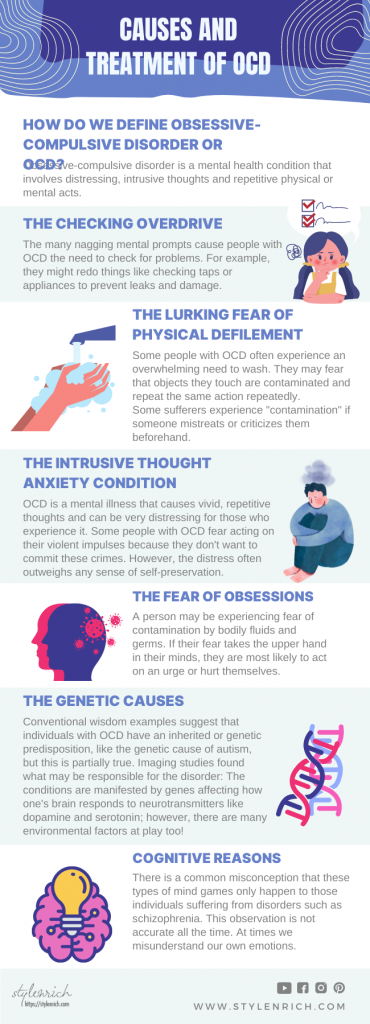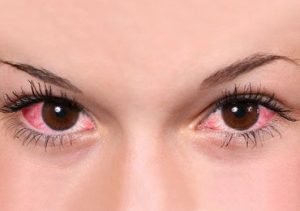Obsessive-compulsive disorder is a mental health condition that involves distressing, intrusive thoughts and repetitive physical or mental acts. Learn how to identify.

How do we define obsessive-compulsive disorder or OCD?
OCD is a complex mental illness that can be extremely challenging to live with. It can cause people trouble in every aspect of their lives. A state of mind that interferes with everything from relationships and jobs down to essential hygiene habits like showering or brushing teeth. People like this tend to be afraid of something going wrong if they don’t do things according to some formula for success. They often wonder how to overcome their helplessness as they find their habits to be way different than others.
People with OCD typically have thoughts, images or urges that they feel unable to control. These intrusive feelings cause them significant discomfort.
The different types of OCD
The checking overdrive-How to identify
The many nagging mental prompts cause people with OCD the need to check for problems. For example, they might redo things like checking taps or appliances to prevent leaks and damage. They will make sure there aren’t any signs indicating illness on their body (such as discomfort while urinating), leading them to believe something is wrong even when it isn’t. They also frequently confirm authenticity by going through emails again in fear of having overlooked some tiny detail that could hurt the recipient.
The lurking fear of physical defilement-How to identify
Some people with OCD often experience an overwhelming need to wash. They may fear that objects they touch are contaminated and hence repeat the same action repeatedly.
Some sufferers experience “contamination” if someone mistreats or criticizes them beforehand. Some might be driven to an endless cycle where contamination is felt everywhere rather than realizing how easily things can be fixed.
The fear of Ghosts
For centuries, mankind has been fascinated and intrigued with the idea of ghosts. Although science aids us in rationalizing thoughts on a similar spectrum, many questions still remain unanswered.
Most people do not suffer from such phobia but for the ones who do, it is a nightmare when confronted with errie feelings. Many people who are afraid of ghosts tend to develop intense fears when exposed to things that involve death (necrophobia).
The intrusive thought anxiety condition
OCD is a mental illness that causes vivid, repetitive thoughts and can be very distressing for those who experience it. Some people with OCD fear acting on their violent impulses because they don’t want to commit these crimes. However, the distress often outweighs any sense of self-preservation. The outcome is unlikely unless you make a drastic change in yourself first- thankfully. This kind of Obsessive-Compulsive Disorder usually starts when children are around five or six years old while going through puberty.
Symmetry and orderliness OCD
This OCD will constantly keep the person on his toes to arrange objects the best way he feels.
The fear of obsessions
A person may be experiencing fear of contamination by bodily fluids and germs. If their fear takes the upper hand in their minds, they are most likely to act on an urge or hurt themselves.
Losing perfectionism will entail focusing on exact things or clearly remembering every detail. Harm includes feelings responsible for some sort-of catastrophe happening unwillingly, such as losing one’s job; Unwanted sexual thoughts about inappropriate acts.
The fear of compulsions
They wash, clean, and monitor the body repeatedly.
A routine activity like getting up from a chair becomes a repetitive act.
A person with OCD would want to review an event frequently.
OCD in children
Children with OCD may experience problems in school, including difficulties completing work and having a hard time making friends. These are just examples of the many complications that can develop when kids have this mental disorder early or before they turn into adulthood!
OCD onsets during childhood, mostly in males than females. It then becomes equally relevant in males and females by adulthood.
The causes of OCD
Experts do not point out any particular cause or reason but have postulated different theories. Genetic, neurological, behavioural, cognitive, and environmental factors are among the most likely reasons for OCD.
The genetic causes
Conventional wisdom examples suggest that individuals with OCD have an inherited or genetic predisposition, like the genetic cause of autism, but this is partially true. Imaging studies found what may be responsible for the disorder: The conditions are manifested by genes affecting how one’s brain responds to neurotransmitters like dopamine and serotonin; however, there are many environmental factors at play too!
Auto-immune related cases
Sometimes, OCD symptoms can appear in children after several infections, like Group A streptococcal diseases like strep throat, Lyme disease, H1N1 flu virus has taken a toll on them.
OCD can hit children hard, too. It’s not always easy to distinguish between an infection and what comes from something else. So, if a child suddenly starts having consistent trouble with things like washroom routines or room cleaning, it could be PANS-pediatric acute-onset neuropsychiatric syndrome!
These kids will often become very anxious about everything going through them at this time, so be sure that they get adequately treated by a professional as soon as possible.
The Behavioural causes of OCD
One theory preaches that a person with OCD learns to avoid certain situations or objects by performing rituals to reduce the perceived risk.
The initial fear may begin around a period of intense stress, such as traumatic events or significant loss.
People with this disorder are often afraid of everything, which means they avoid many situations that would otherwise be considered safe. They might check to make sure door locks work or repeatedly wash their hands until the feeling is gone-even if there’s no evidence of something dirty on them!
Cognitive reasons
There is a common misconception that these types of mind games only happen to those individuals suffering from disorders such as schizophrenia. This observation is not accurate all the time. At times we misunderstand our own emotions. For some people with OCD, the thoughts they have is very intense. The little voices going through their heads can impact them negatively and eventually become the primordial reason for OCD.
As the parent of an infant, you may find yourself constantly worrying about hurting your newborn. You might have intrusive thoughts that something will happen. To avert the possibility of that foreseen fear, you end up taking excessive precautions, which is mentally and physically exhausting.
Environmental causes
The symptoms of OCD are both distressing and disruptive to daily life. Stressful events, such as childbirth complications or illness, can trigger the disorder in people who have a similar mental predisposition. OCD could also be triggered due to genetic factors, including an inherited tendency toward anxiety and other psychiatric disorders like depression.
The diagnosis of OCD
Doctors can diagnose OCD using the criteria listed above. The patient should undergo treatment as soon as possible to learn more about what causes them to start getting better emotionally! If they meet the following indicators, they are highly likely that their patient has this disorder.
Cognitive Behavioral therapy
This treatment is a type of psychotherapy that helps people change how they think, feel and behave. It may involve two different treatments; exposure & response prevention (ERP) or cognitive therapy; either way, it’s an effective method for treating mental illness!
ERP involves:
The treatment is about exposure therapy to situations and objects that trigger fear or anxiety. Over time, repeated exposure leads these fears away as they become less severe over more extended periods. This process is called “desensitization”. This approach acclimatizes people to resist compulsive behaviours when their minds cannot succumb easily. They being conditioned by past experiences immediately relate the outcome of such actions will lead only to pain. This newly articulated behaviour helps them to develop robust self-control. Repeatedly resorting to it prevents them from falling into former ways of easily giving in to temptations for the sake of some temporary pleasure.
The therapist encourages the person to examine their beliefs about engaging or refraining from compulsive behaviour. Identify cognitive distortions that support this obsession and develop a less threatening alternative response.
For example: “Cognitive therapy techniques start by encouraging you in identifying your current thoughts on what happens when I engage or don’t engage with my obsessive thinking.”
Summary
OCD is a mental health condition that can have adverse effects on an individual’s life. However, treatment with medications often helps relieve the symptoms of moderate or severe levels. In some cases it may even improve them so significantly you would never know who had this before!

















